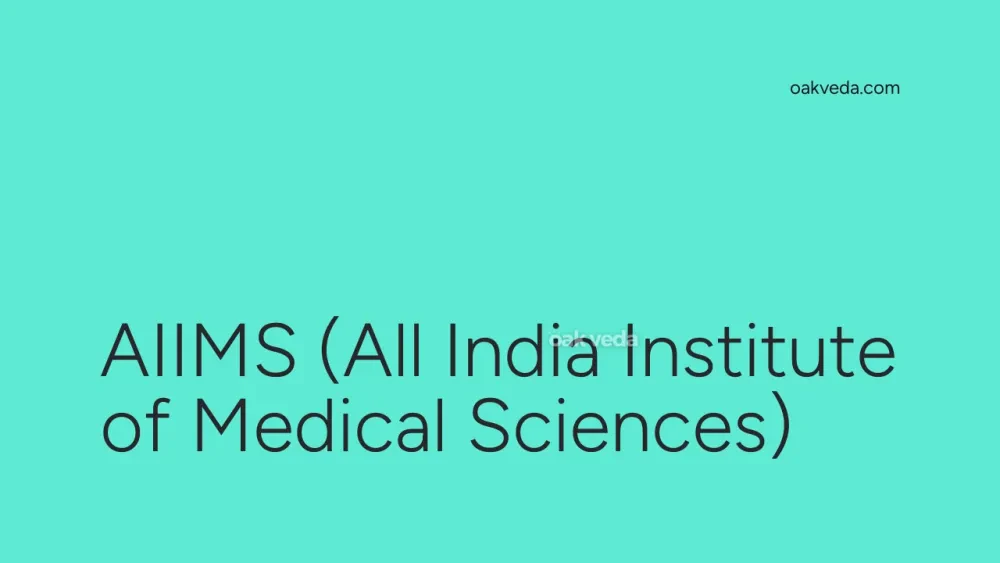
What is the Full Form of AIIMS?
The full form of AIIMS is All India Institute of Medical Sciences. This prestigious institution plays a crucial role in India's healthcare and medical education system, setting high standards for both undergraduate and postgraduate medical courses.
What is All India Institute of Medical Sciences?
All India Institute of Medical Sciences (AIIMS) is a network of autonomous public medical universities established by the Government of India's Ministry of Health and Family Welfare. These institutions are designated as Institutes of National Importance, reflecting their significant contribution to medical education, research, and healthcare in India.
Origin and Development of AIIMS
The journey of AIIMS began in 1956 under the visionary leadership of India's first Prime Minister, Jawaharlal Nehru, and Health Minister Rajkumari Amrit Kaur. The institution was established through an Act of Parliament with the primary goal of creating a center of excellence in all aspects of healthcare.
Key milestones in AIIMS development:
- 1956: Establishment of the first AIIMS in New Delhi
- 2012: Expansion initiative to set up new AIIMS in various states
- 2020: Further expansion to ensure at least one AIIMS in each state
How does AIIMS work?
AIIMS operates as a network of autonomous institutions, each functioning independently while adhering to the core principles and standards set by the central governing body. These institutions work in three primary areas:
- Medical Education: Offering high-quality undergraduate and postgraduate medical programs
- Research: Conducting cutting-edge medical research and publishing findings
- Patient Care: Providing advanced healthcare services to the public
Types of AIIMS Institutions
While all AIIMS institutions follow the same core principles, they can be categorized based on their establishment timeline:
- Original AIIMS: The first AIIMS established in New Delhi
- New AIIMS: Institutions set up under the Pradhan Mantri Swasthya Suraksha Yojana (PMSSY)
- Upcoming AIIMS: Institutions in various stages of development across different states
Functions of AIIMS
AIIMS serves multiple crucial functions in India's healthcare ecosystem:
- Medical Education: Offering a wide range of medical courses, including the prestigious MBBS program
- Research and Innovation: Publishing over 600 research papers annually, contributing significantly to medical science
- Patient Care: Operating large hospitals and specialized centers for various medical conditions
- Policy Advice: Providing expert guidance to the government on healthcare policies and practices
- Community Health: Running outreach programs and satellite centers to improve healthcare access in rural areas
Applications of AIIMS
The impact of AIIMS extends beyond its campuses:
- Setting Medical Standards: AIIMS sets benchmarks for medical education and practice across India
- Addressing Health Challenges: Tackling complex medical cases and emerging health threats
- Training Healthcare Professionals: Producing highly skilled doctors, nurses, and other medical professionals
- Advancing Medical Technology: Pioneering new treatments and medical technologies
- Public Health Initiatives: Implementing and supporting various national health programs
Features of AIIMS
AIIMS institutions are characterized by several unique features:
- State-of-the-art Infrastructure: Equipped with modern medical facilities and advanced technology
- Multidisciplinary Approach: Covering all aspects of medical science under one roof
- Affordable Healthcare: Providing high-quality medical care at subsidized rates
- Research-oriented Culture: Encouraging innovation and continuous learning
- Rigorous Selection Process: Admitting only the top-performing students through competitive exams
Benefits of AIIMS
The establishment of AIIMS has brought numerous benefits to India's healthcare system:
- Improved Healthcare Access: Bringing advanced medical facilities to different regions of India
- Enhanced Medical Education: Raising the standard of medical education across the country
- Boost to Medical Research: Contributing significantly to global medical knowledge
- Reduced Brain Drain: Providing world-class opportunities for medical professionals within India
- Cost-effective Healthcare: Making advanced treatments accessible to a larger population
Limitations or Challenges of AIIMS
Despite its success, AIIMS faces several challenges:
- Overwhelming Patient Load: Dealing with an extremely high number of patients, often leading to long waiting times
- Resource Constraints: Managing limited resources to meet the growing healthcare demands
- Geographical Disparities: Ensuring equal distribution of AIIMS facilities across all states
- Retention of Talent: Competing with private sector and international opportunities to retain top medical professionals
- Balancing Research and Patient Care: Maintaining a balance between academic pursuits and healthcare delivery
Future Developments in AIIMS
The future of AIIMS looks promising with several initiatives in the pipeline:
- Digital Health Integration: Implementing telemedicine and AI-driven diagnostics
- Expansion of Specialties: Introducing new super-specialty departments and courses
- Global Collaborations: Fostering partnerships with international medical institutions
- Focus on Preventive Healthcare: Developing programs for early disease detection and prevention
- Sustainable Healthcare Models: Exploring eco-friendly practices in healthcare delivery
FAQs on AIIMS Full Form
-
What is the full form of AIIMS? The full form of AIIMS is All India Institute of Medical Sciences.
-
How many AIIMS are there in India? As of 2023, there are 22 AIIMS institutions operational or under development across India.
-
Is AIIMS a government institution? Yes, AIIMS is a government institution established and run by the Ministry of Health and Family Welfare, Government of India.
-
What courses does AIIMS offer? AIIMS offers various medical courses including MBBS, MD, MS, DM, M.Ch, Ph.D., and several paramedical courses.
-
How can one get admission to AIIMS? Admission to AIIMS for undergraduate courses is through the National Eligibility cum Entrance Test (NEET), while postgraduate admissions are based on the AIIMS PG Entrance Examination.
You may be interested in:

